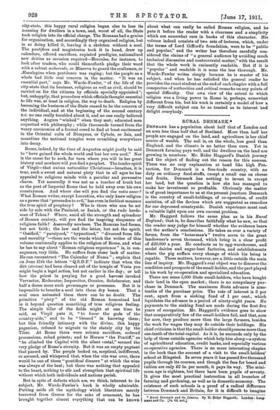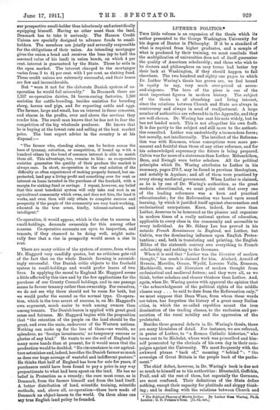RURAL DENMARK.*
DENMARK has a population about half that of London and an area less than half that of Scotland. More than half her people are engaged on the land, and agriculture is her chief source of wealth. The soil is, on the whole, less good than England, and the climate is no better than ours. Yet in Denmark farming pays well, and the dwellers on the land are growing in numbers. Mr. Rider Haggard's Danish journey had the object of finding out the reason for this success. There was no easy explanation at band like high Pro- tection, for Denmark is a free-trade country, with no duty on ordinary food-stuffs, except a small one on cheese and fruits. Denmark has nothing to invest in except her land, but the question is bow she has managed to make her investment so profitable. Obviously the matter is of great importance to us at the present juncture. Denmark is the country of small-holdings, of co-operation, of credit societies, of all the devices which are suggested as remedies for our depressed countryside. Danish experience must cast a valuable light upon our own current problem.
Mr. Haggard follows the same plan as in his Rural England; that is, he describes faithfully what he saw, so that the reader may judge for himself whether the evidence bears out the author's conclusions. He takes us over a variety of farms, from the "houseman's" twelve acres to the great landowner's seven thousand, which bring in a clear profit of £20,000 a year. He conducts us to egg-warehouses, and model dairies and sugar-beet factories, and establishments where the pig suffers every change of which his being is capable. These matters, however, are a little outside the main line of inquiry. Mr. Haggard's real object was to discover the condition and prospects of the small-holder, and the part played in his work by co-operation and specialized education.
There are some 5,000 State small-holders, who have bought their land in the open market ; there is no compulsory pur- chase in Denmark. The maximum State advance is nine- tenths of the purchase price. The rate of interest is 3 per cent., apart from a sinking fund of 1 per cent., which liquidates the advance in a period of ninety-eight years. No payments to the sinking fund are made during the first five years of occupation. Mr. Haggard's evidence goes to show that comparatively few of the small-holders fail, and that, acre for acre, they produce more than the large farmers, besides the work for wages they may do outside their holdings. His chief criticism is that the small-holder shouldpossess more than one-tenth of the total capital. As it is, he succeeds only by the help of three outside agencies which help him along—a system of agricultural education, credit banks, and especially various co-operative agencies. There is no more interesting chapter in the book than the account of a visit to the small-holders' school at Ringsted. In seven years it has passed five thousand pupils through its courses, and though the fees for board and tuition are only £2 5s. per month, it pays its way. The mini- mum age is eighteen, but there have been pupils of seventy. It gives the most practical instruction in all branches of farming and gardening, as well as in domestic economy. The existence of such schools is a proof of a radical difference between Denmark and Britain, for it ia difficult to imagine • Rural Denmark and its Lessons. By H. Bider Haggard. London; Long. Mans and Co. [6s. 64. ziet.J
our prospective small-holder thus laboriously and scientifically equipping himself. Having no other asset than the land, Denmark has to take it seriously. The Hansen Credit Unions are specially designed to advance funds to small- holders. The members are jointly and severally responsible for the obligations of their union. An intending mortgagor gives the union a bond and receives the loan (up to half the assessed value of his land) in union bonds, on which 4 per cent. interest is guaranteed by the State. These he sells in the open market. The interest charged to the mortgagor varies from 3 to 4i per cent. with 1 per cent. as sinking fund. These credit unions are extremely successful, and their losses are few and inconsiderable.
But " were it not for the elaborate Danish system of co- operation he would fail miserably." In Denmark there are 1,157 co-operative dairies, 34 bacon-curing factories, 1,260 societies for cattle-breeding, besides societies for breeding sheep, horses and pigs, and for exporting cattle and eggs. The farmer, large and small, has an interest in these concerns, and shares in the profits, over and above the services they render him. The small man knows that he has not to fear the competition of the big wholesale producer. He knows that he is buying at the lowest rate and selling at the best market price. The best expert advice in the country is at his disposal :—
" The farmer who, standing alone, can be broken across the knee of tyranny, extortion, or competition, if bound up with a hundred others by the bond of common interest is able to match them all. This advantage, too, remains to him : as co-operative societies guarantee the quality of their produce the market is always sure. In short, co-operation is the real solution of the difficulty so often experienced of making properly farmed, but un- protected, land pay a living profit and something over for rent or interest on loans invested in the purchase of the freehold, with a margin for sinking fund or savings. I repeat, however, my belief that this most beneficial system will only take real root in an agricultural community which owns, and does not hire, the land it works, and even then will only attain to complete success and prosperity if the people of the community are very hard-working, educated in the true sense, kindly, tolerant-natured, and intelligent."
Co-operation, it would appear, which is the clue to success in small-holdings, demands ownership for this among other reasons. Co-operative accounts are open to inspection, and tenants, if they chanced to be doing well, might natu- rally fear that a rise in prosperity would mean a rise in rent.
There are many critics of the system, of course, from whom Mr. Haggard very candidly quotes, but no criticism gets rid of the fact that on the whole Danish farming is astonish- ingly successful. One Danish critic objects to the freehold system in small-holdings and would prefer leases of two lives. In applying the moral to England Mr. Haggard seems a little affected by this view and by the few applications for the purchase of our County Council holdings, and in one passage seems to favour tenancy rather than ownership. For ourselves, we do not see why there should not be room for both, but we would prefer the second as the normal type. Co-opera- tion, which is the true secret of success, is, on Mr. Haggard's own argument, much easier to work among owners than among tenants. The Danish lesson is applied with great good sense and fairness. Mr. Haggard begins with the proposition that "the retention of the people on the land should be the great, and even the main, endeavour of the Western nations. Nothing can make up for the loss of them—no wealth, no splendour, no foreign investments,' no temporary success or glories of any kind." He wants to see the soil of England in many more hands than at present, for it would mean that the production would be doubled. "No circumstance in our agricul- ture astonishes and, indeed, horrifies the Danish farmer so much as does our huge acreage of wasteful and indifferent pasture." He thinks that half of England has been for sale for years, if purchasers could have been found to pay a price in any way proportionate to what had been spent on the land. He has no belief in Protection as a remedy; the cure must come, as in Denmark, from the farmer himself and from the land itself. A better distribution of land, scientific training, scientific methods, and, above all, co-operation--these have made of Denmark an object-lesson to the world. On them alone can my true English land policy be founded,











































 Previous page
Previous page